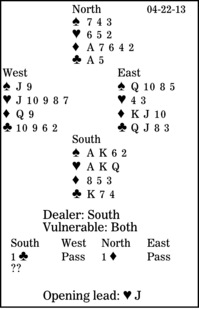Bridge column, April 22: Opener's rebid paves the auction's path

When a player makes his second bid, he should give more information about the distribution and strength of his hand than he supplied with his initial call. Let's look at the opener's choices this week after partner has responded at the one-level. What should South rebid in this deal?
This is the basic theory: If he makes a minimum rebid, he shows minimum count, sometimes 12-14 points; at other times it will be 12-16 (or an unexciting 17). If opener makes a jump rebid, he guarantees extra strength, 15-17 or (17-plus) 18-20. Also, if he bids a new suit at the two-level, he indicates at least five cards in his first suit. Bidding a suit for the second time promises at least six. And no-trump specifies a balanced hand.
Here, South should rebid two no-trump, showing (a good 17) or 18 or 19 (or a bad 20). This rebid does not deny a four-card major and is in principle game-forcing.
Against three no-trump, West leads the heart jack. South has eight top tricks: two spades, three hearts, one diamond and two clubs. His best chance is a 3-2 diamond split. However, dummy is short of entries. The right play is to win trick one and duck (lose) a diamond. Declarer wins the second heart and ducks another diamond. He takes the next (heart) play by East, leads his last diamond to dummy's ace, and cashes the two remaining winners in the suit, giving him 10 tricks in all.
** ** **
COPYRIGHT: 2013, UNITED FEATURE SYNDICATE
DISTRIBUTED BY UNIVERSAL UCLICK FOR UFS

